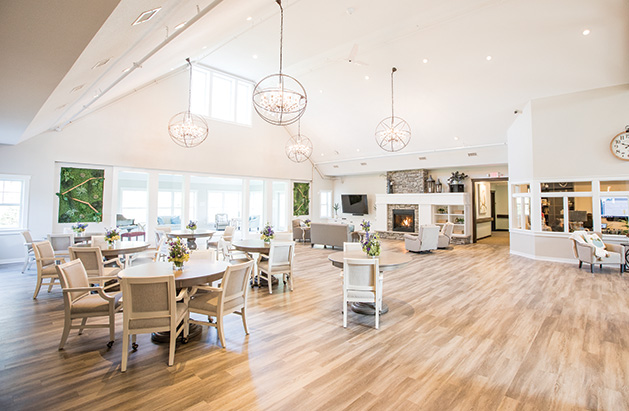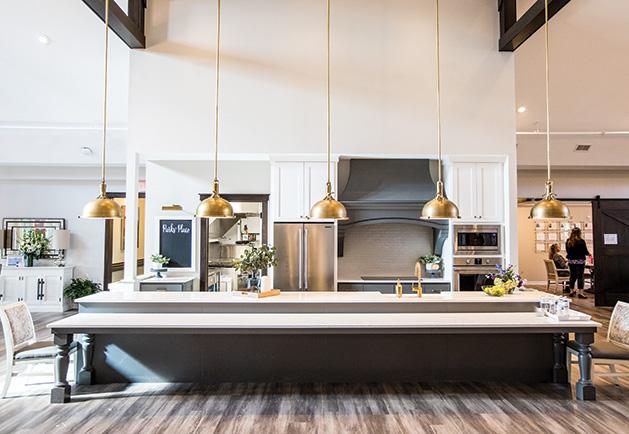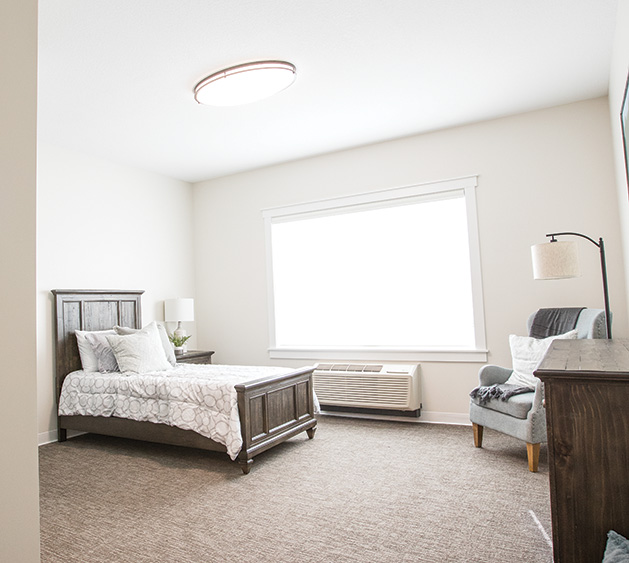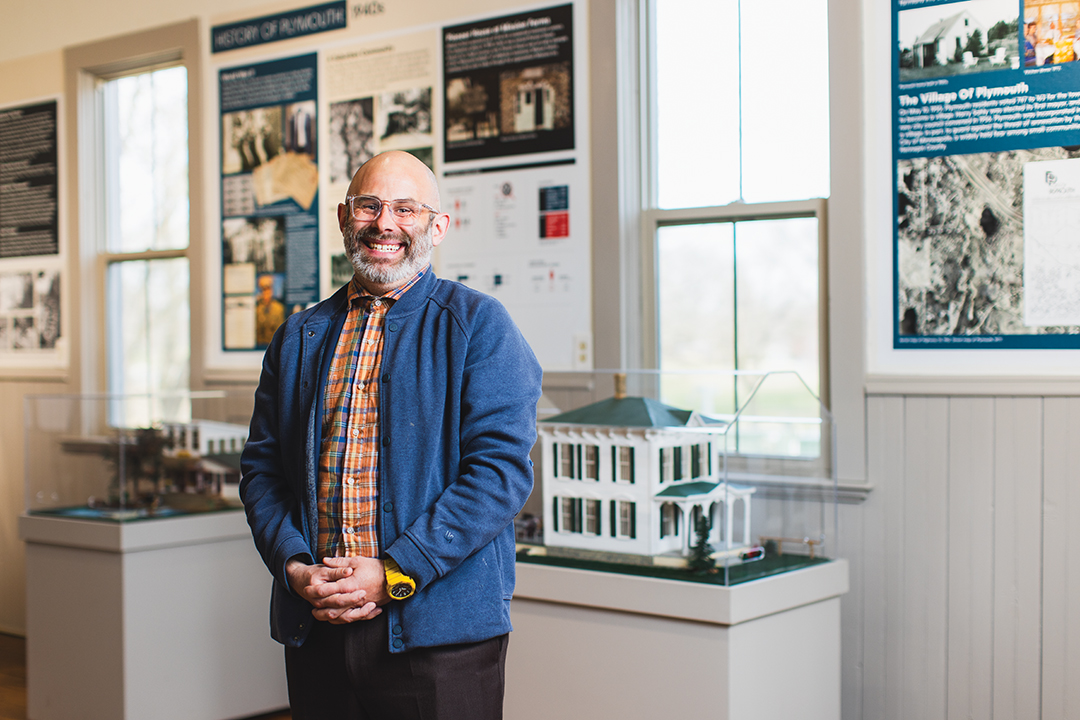
Jerry and Karen Parks, founders of Parks’ Place: Memory Care Redefined. Photos: Chris Emeott
Parks’ Place opened in October and was specifically designed with memory care in mind.
Jerry Parks, a former vice president at a large Minneapolis construction company, had been the breadwinner for his family. Over time, says his wife Karen Parks, the family noticed changes. “Jerry would forget things like what time his kids’ soccer game was, and then would ask me again, forgetting that he had already asked me,” she says. Eventually, Jerry was not able to function in his high-powered position, lost his job and several jobs after that. Because Jerry was much younger than the age people tend to associate with a diagnosis of Alzheimer’s disease, the cause for Jerry’s symptoms remained unknown for years, says Karen.
The symptoms continued to increase, and his ability to function declined. “It didn’t happen overnight,” says Karen. “I transitioned gradually into becoming a caregiver.” After years passed with the cause of Jerry’s symptoms remaining a mystery, Mayo Clinic diagnosed Jerry with younger-onset Alzheimer’s disease.
“When we got the diagnosis, Jerry sat us down and said, ‘We can spend our time mourning or we can be proactive and fight to make a difference,’” says Karen.
The family took Jerry’s words to heart. “Jerry participated in drug trials and cognitive research at Mayo Clinic and University of Minnesota. We both went to Washington with the Minnesota chapter of the Alzheimer’s Association six times to advocate for Alzheimer’s research. One of our daughters formed a support group for children of parents with younger-onset Alzheimer’s— none had existed before,” says Karen.
Karen was also part of a successful effort to make people with younger-onset Alzheimer’s eligible for Social Security disability benefits under its Compassionate Allowances initiative.
“When it became clear that Jerry needed memory care, we looked at a lot of places, but none of them were what we were looking for. We wanted a place that cared about the individual, with activities appropriate for individuals’ ability levels so they could find people who they could interact with,” says Karen.
Senior continuum-of-living facilities are often geared toward independent seniors, says Karen. “To attract independent seniors, developers build beautiful facilities with things like long walking paths. That’s where their energies are put. They’ll add a memory care wing which will eventually have outsourced aides— memory care is a secondary thought and not a focus,” Karen says.

The kind of place the Parks family wanted for their husband and father didn’t exist, so they went back to Jerry’s words and created that place—Parks’ Place: Memory Care Redefined—which opened this past October.
The Parks family acquired land in Plymouth, intentionally choosing a spot in a neighborhood near a church and a school, and partnered with Augustana Care, an organization with a long history of providing older-adult and memory-care services, to manage and operate Parks’ Place. (In 2018, Augustana Care and Elim Care, another longtime provider of senior-care services combined to form Cassia.)
In contrast to senior-living facilities where it’s more like an afterthought, Parks’ Place is dedicated to memory care. “All of our energy, all of our choices at Parks’ Place are made with the needs of the residents and their families in mind,” says Karen.

The Parks family wanted there to be a kitchen similar to what residents would have at home, though a staff member must be present to access the appliances.
“The families’ needs are very important to us. We want families to feel supported, embraced and comfortable. [At Parks’ Place], they can meet people who are living through the same experience. They can get support from others who are going through the same losses. [Having a loved one with dementia] is traumatic, it’s devastating. You need to be able to talk to people who are going through the same thing,” says Karen.
To encourage families to spend time with loved ones at Parks’ Place and connect with other families, Parks’ Place is designed to be comfortable and pleasant for visitors as well as for residents. “Facilities can be sterile, and not a comfortable place to be. Many visitors go out of obligation. We not only want residents to feel at home, we also want it to be a place that’s enjoyable for visitors—a pleasant place where visiting family can meet other families to build a support network,” says Karen.
Cassia’s regional director of operations Julianne Fries says, “One of the distinguishing aspects of Parks’ Place is that it’s very much a community that embraces the family unit and anyone associated with that resident.”
“The Parks family has put hours and hours into carefully selecting every piece of this building—bricks and mortar, furniture, paint colors, layout of the building. It’s all specifically designed for folks with cognitive impairment,” says Fries.

Pleasant, bright lighting is an important factor in room design at Parks’ Place.
Life-enrichment programming is another key aspect of Parks’ Place, says Karen. She believes having appropriate activities available is critical to the well-being of people living with dementia. “They need ability-based projects so they can feel a sense of accomplishment. Activities also need to change over time as people’s abilities change. And it’s important to remember that people with dementia can learn and re-learn skills,” says Karen.
Fries says, “Parks’ Place’s daily programming will be very robust with many options and will be individualized to different cognitive abilities. Activities will meet people where they’re at in their dementia.”
Individualized care is another defining aspect of Parks’ Place, says Karen. “Caregivers will know residents as individuals and care for them accordingly. We will have our own care providers who will be trained and who will get to know individuals’ idiosyncrasies—the things that make them who they are,” she says.
To ensure the individualized, premier-quality care that Parks’ Place is committed to, director of health and housing Courtney Rieck, R.N., says, “We’re being very diligent and very particular about our staffing. We want to bring people on who are excited about this mission. We see elder care and dementia care as a type of specialty, and it takes a particular kind of person to be interested in this type of work. If a person says this is part of their life mission, that’s the kind of person we can work well with. And we’re lucky that our resources allow us to have premier staffing ratios.”
“[The Parks family] cares about optimizing and cares about having people happy at work. That means everybody—housekeeping, the aides, nursing staff. By having a loving environment, we’re going to be able to keep people who are excited to come to work,” says Fries.
“Our family will be a presence in the building. Families will know we care. Staff will know we care,” says Karen.
Parks’ Place has a capacity of 36 residents. “In a smaller community, care can be more individualized so that we can be the best possible home for that person and that family,” says Fries.
Programming will be based on circadian rhythm. “There will be a natural rhythm to the day for activities and rest time. It helps provide stability through routine, and residents will sleep better at night. And circadian programming helps with challenging behaviors often associated with dementia,” says Fries.
“Parks’ Place is the culmination of a 19-year journey from when Jerry was first diagnosed to now, when the kind of memory care we want for him is becoming a reality,” says Karen. “While this diagnosis would never be considered a blessing, we hope our actions will be a blessing for others, and we hope Parks’ Place will be a blessing for others.”
Parks’ Place: Memory Care Redefined
18040 Medina Road, Plymouth






















